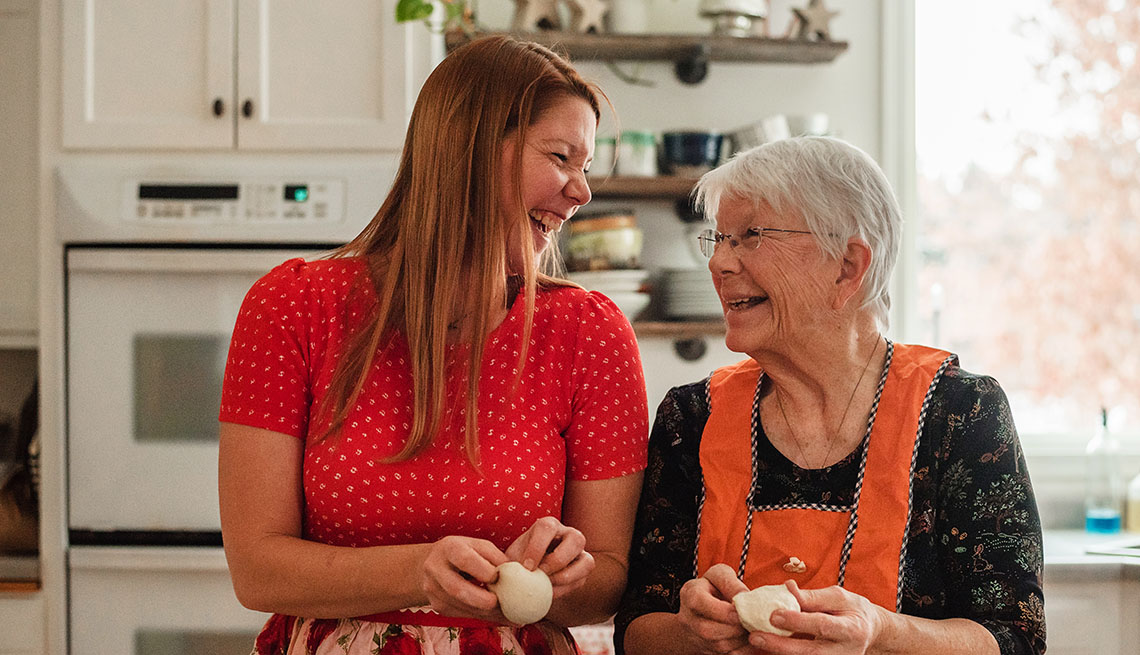
How do you bring joy to someone living with dementia?
- Select a language for the TTS:
- UK English Female
- UK English Male
- US English Female
- US English Male
- Australian Female
- Australian Male
- Language selected: (auto detect) - EN
Play all audios:

UNDERSTAND CHANGING NEEDS There is no one-size-fits-all solution when it comes to dementia, according to Landsverk. Each family or person needs to decide what works best for their loved one
and their own situation. She reminds us that a person with dementia is still a grownup with feelings, needs and wants just like anyone else. They want to make choices about what they do and
what they eat, even though they may not be able to voice their desires. “Even while their abilities are diminishing, they are still an adult,” says Landsverk. People with dementia aren’t
trying to be difficult. They simply may not be consciously aware that they’ve changed, which is part of the disease. Dementia patients reflect their view of the world, which means they might
get angry about little things, like cold coffee, being told they can’t do something or feeling coddled. They may also feel like they are a “hostage” if they are unable to participate in
activities they used to do, like driving or writing checks. Landsverk believes that a little bit of knowledge about the disease can make a big difference in how everyone moves forward.
Beyond practical issues, such as how to find extra care, the legalities of medical directives and caregiver life skills, I was curious about what we could control by being informed. “As we
age, multiple changes happen in our bodies that affect our health and behavior,” says Landsverk. “Most of us have more fat, less body water, less reserve in the kidneys and liver. We don’t
process alcohol the way we used to. And our brains begin to change.” She stresses the importance of understanding these changes and incorporating a healthy diet along with exercise into
every single day to optimize for health. “There are lots of ‘miracle dementia reversing’ claims or supplements,” Landsverk cautions, but no supplements or vitamins have been proven to slow
down or prevent cognitive decline. The Global Council on Brain Health advises that a plant-based diet that is rich in fruits and leafy green vegetables is best, and 30 minutes of daily
exercise has a positive impact on brain health. SEEKING JOY Questions to ask yourself to help find joy for you and your loved one. * How has your loved one lived life? What are his or her
general values and beliefs? What statements did he or she make about growing older and the end of life? * Before your loved one became sick, what was the most important thing in his or her
life? What is most important now? What brings him or her joy? * What are your fears for your loved one? What do you hope to avoid? What are your fears for yourself? * Does your doctor see
the bigger picture around this disease? How does your doctor feel about medications and pain management? * Do you have enough help with care? Can your loved one’s assets be used to help
support care? Who else can assist, from family to local organizations such as your local county division on aging? Remember: The goal is to find answers that conform to what your loved one
would have wanted based on their current actions or past situations. FINDING NEW JOY Many things can bring joy, including focusing on the “now” with loved ones. “It’s finding the ability to
live in the moment,” says Landsverk. She suggests caregivers start with thinking about what their loved one enjoyed in the past, but not get stuck there. Understanding what brought joy and
then modifying those activities as the situation changes is one of the fundamental tenets of finding happiness with that person, according to Landsverk. “They may no longer be able to paint
pictures, but perhaps they can make collages. Eating out at a restaurant might result in an angry scene, but a picnic could be a lovely substitute,” offers Landsverk. “A night at the
ballpark might no longer be possible, but maybe walking around the ballpark before a game or engaging your loved one in a game of dominoes with others could be pleasurable.” Landsverk also
emphasizes “the joy of connection.” Even for people who are no longer verbally responsive, there are ways to enjoy aspects of human interaction and experiences through touch or music. Music
is particularly powerful, and our memories of songs reside in a slightly different part of our brains than words. Landsverk has observed people who cannot answer questions sing church hymns
perfectly, bringing joy and comfort to all. She recalls a performance by a bongo player at a senior center where some older adults responded with joyful expressions and by swaying and
“singing” along. Try to determine what simple activities, including group ones, can still be enjoyed, such as going for a walk, watching children at the park or even just holding hands. The
key is to try to keep the person with dementia active and engaged and try to bring them with you until they can no longer handle the situation. “We also need to recognize that giving up some
of these traditions will be hard,” says Landsverk. “Try not to put yourself in a situation that will make you sad or depressed.”
